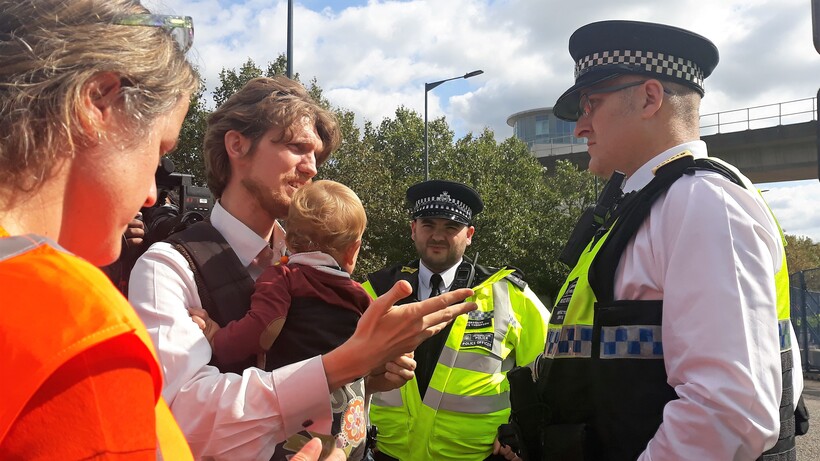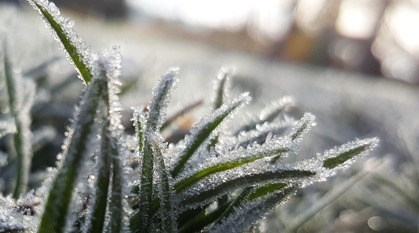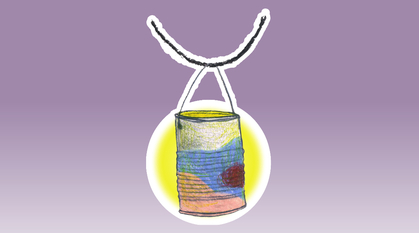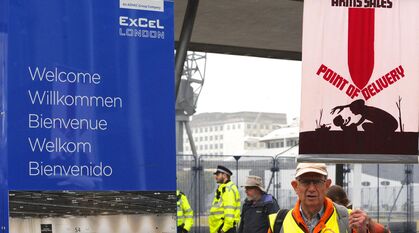Talking across the divide
Bridget Holtom reflects on having conversations with people who may see the world differently, as part of putting faith into action.

In this time of growing division, my encounters with people who have radically different beliefs to mine are few and far between. My circles are becoming the classic echo chamber of familiar news stories. I am scared that in another ten years' time these conversations won't just be uncomfortable, talking across the divide might be impossible.
I feel called to try to do my bit to bridge differences between people. I believe that human connection and friendship, deep listening and curiosity across difference is a form of ministry. Listening and continuing to love family and friends who think differently from me is one of the ways I try to put my faith in action. With the DSEI Arms Fair just around the corner, how should we as Quakers interact with people who work in the military industry and with the police officers and Police Liaison Officers who may be present while the right to protest is steadily eroded?
Finding connections
I bumped into a former colleague from the civil-service grad scheme recently who Quakers might say has 'gone over to the dark side'. We had been close ten years ago and so we met a week later to swap stories and talk about the usual things early 30-year-olds are up to – what babies are on the way, disastrous DIY, the cost of living etc. etc.
We quickly got onto what we do for a 'living'. I love that question now I work for Quakers in Britain. People rarely ask about faith or spirituality in the first five minutes of small talk but now I get to tell taxi drivers, family friends and people down t' pub about Quakerism almost every day. I enjoy answering their questions about oats, same-sex marriage and non-hierarchical structures and hearing from them what they believe, where we differ and where we are the same.
Open conversations
It is a Monday afternoon and my old colleague and I are sitting in a cafe at a busy crossroads watching people push prams, grab a Greggs pasty and battle with umbrellas in the unpredictable British summer weather. We eventually get onto my role as Engagement and Faith in Action Lead and I tell him that ministry for Quakers means putting our values and faith in to action. I shared that one thing my team do is support Quaker activism and we are currently supporting Quakers to prepare for a silent vigil and meeting for worship at the No Faith in War Day at the bi-annual DSEI Arms Fair in London in September.
"Interesting" he said, "you're not going to like what I do then."
"Oh really, what is it that you do for a living?" I asked.
"You'd probably say what do I do for a 'dying'?" he replied.
I felt the gulf open up between us, that space of discomfort when you anticipate confrontation where before there was connection.
"I work in research, think-tank sort of stuff…about the military…the arms trade is a big part of it."
He was right, I don't like what he does to make money, and I told him so. But I also told him it doesn't mean I don't like him as a person.
All workplaces are made up of human beings. With hearts and minds, families and hopes for the future. As long as there are wars, there will be arms fairs and if there are arms fairs there will be human beings behind the scenes. Once I had shown my curiosity, he relaxed and opened up about all sorts of interesting things I would never otherwise have known about.
He spoke about the arms trade like it was any other business. I found the mundane nature of the industry shocking but also fascinating. He noted how business was "rapidly recovering since Covid", how "business was booming" since the war in Ukraine and spoke candidly about which weapons are made and/or sold on these soils.
The humans in the system
It can be difficult to see humanity within the military industry. For me it takes an extra effort to see God/good in people who financially benefit by working in the military, the fossil fuel industry and the police or border force. It feels like a balancing act, trying to hold people to account for their complicity as well as trying to see their humanity. As well as being a human being with a face and a family, workers in these industries are also very much a part of the 'system'.
At the DSEI Arms Fair in September, as well as encounters with employees of the arms companies or their potential customers many Quakers will come into contact with the police and perhaps Police Liaison Officers (PLOs). Police Liaison Officers are the 'friendly' face of police forces in Britain, they wear blue vests and are there to act as a go-between. Police Liaison Officers appear approachable and somehow separate from the police of which they are a part.
However, this NetPol video reminds us that we should not forget that the information they collect (such as names, how far you have travelled to attend, whether you have been before and how many people you travelled with) are used in wider police operations and PLOs do sometimes pass on information that can be used against people in court.
When the right to protest is being systematically dismantled and the police are being given more sweeping powers, how do we respond to police and police liaison officers? There is a balance to be struck – we must see the human in the system and the system in the human at the same time.
Searching for the light in all
It is not always easy and it is at these times that my faith, patience and friendships are most challenged. What does it mean to believe in that of God in everybody? To really search to see that there is a sort of goodness or light in all people, even those buying and selling some of the most evil and destructive weapons humans have ever created? What conversations could you be having in the run up to the DSEI arms fair that challenge you as well as the people you're speaking to but might just be the conversation we all need to be having?
Get involved and find out more about Quaker DSEI actions and events


